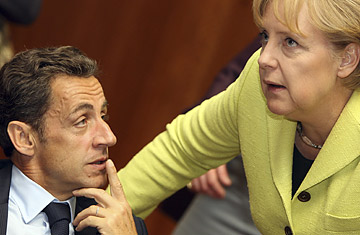
French President Nicolas Sarkozy, left, shares a word with German Chancellor Angela Merkel
While President Obama has chosen a deliberately measured response to the contested Iranian election, European leaders have been far less restrained in their comments. On June 16, four days after the presidential election, French President Nicolas Sarkozy called the contested poll a "tragedy" and added that "the extent of the fraud is proportional to the violent reaction." That same day, the Italian Foreign Minister, Franco Frattini, said the violence in the streets and the deaths of protesters were "unacceptable." Three days later, British Prime Minister Gordon Brown referred to "the repression and the brutality" in Iran. Over the weekend, German Chancellor Angela Merkel went further, calling on Iran's leaders to "allow peaceful demonstrations, allow free reporting of events, stop the use of violence against demonstrators and free imprisoned people."
Commentators and some Republicans in the U.S. have contrasted these strongly worded condemnations with Obama's more tepid comments. "The President of the United States is supposed to lead the free world, not follow it," South Carolina Senator Lindsey Graham said on Sunday. So why has Europe, so often cast as the more timid side of the transatlantic partnership, responded more vigorously this time? The answer, according to Robin Niblett, director of the London-based international-relations think tank Chatham House, lies in the low-rumbling crisis in the background of the disputed election: Iran's nuclear program.
"The United States is the only country that can convince Iran that it is not as threatened as it thinks it is, and that's crucial to the negotiations [over Iran's disputed enrichment program]," Niblett says. "The Obama Administration is playing it absolutely right: it is determined to convince the Iranians that its goal is not regime change. Any public denunciations could damage Obama's efforts to coax Iran out of its defensive posture."
Obama and his aides have repeatedly said they want to avoid becoming a scapegoat for Iran's leadership. "The last thing that I want to do is to have the United States be a foil for those forces inside Iran who would love nothing better than to make this an argument about the United States," the President said in an interview broadcast on Monday morning. "We shouldn't be playing into that."
Domestic politics is also playing into the strong rhetoric on the part of European leaders like Sarkozy and Merkel, according to Niblett. "It is in Sarkozy's nature to be plain-speaking and tough, and that's played well domestically. His popularity has dropped recently, so his stance on the importance of free elections plays well. It does for Merkel too, as it distinguishes her from [Social Democrat Foreign Minister and Vice Chancellor] Frank-Walter Steinmeier, who has been more measured in his response."In recent days, the Islamic Republic has become increasingly vocal in its complaints of interference on the part of Western politicians and journalists. On Monday, it accused BBC's Persian-language station and the Voice of America (VOA) of being "officially the spiritual children of [Benjamin] Netanyahu," the Prime Minister of Israel. "Their aim is to weaken the national solidarity, threaten territorial integrity and disintegrate Iran," Foreign Ministry spokesman Hassan Ghashghavi told reporters. "This is the agenda given to VOA and BBC Persian after their budgets were approved by the U.S. Congress and the British Parliament."
Lawrence Freedman, a professor of war studies at King's College London, says such rhetoric from Iran may force Obama to move closer to the European leaders in toughening his public stance on Iran. "It will become more likely that the U.S. and Europe will find a consensus if the Iranian regime becomes more oppressive, or as their pronunciations of Western interference become more extreme. You can't give credence to those accusations, and you'll need strong rebuttals from both European and American leaders."
In fact, while there have been real splits between the U.S. and Europe in other international crises — most divisive, Europe's reluctance to send combat troops to Afghanistan — the allies are hardly at odds in their basic response to the Iranian election. "There isn't a deep underlying difference — both sides would like to see free and fair elections in Iran," says Niblett. "But there are various factors that have prevented a unified response. And that's O.K. In this regard, Obama should play it differently."
